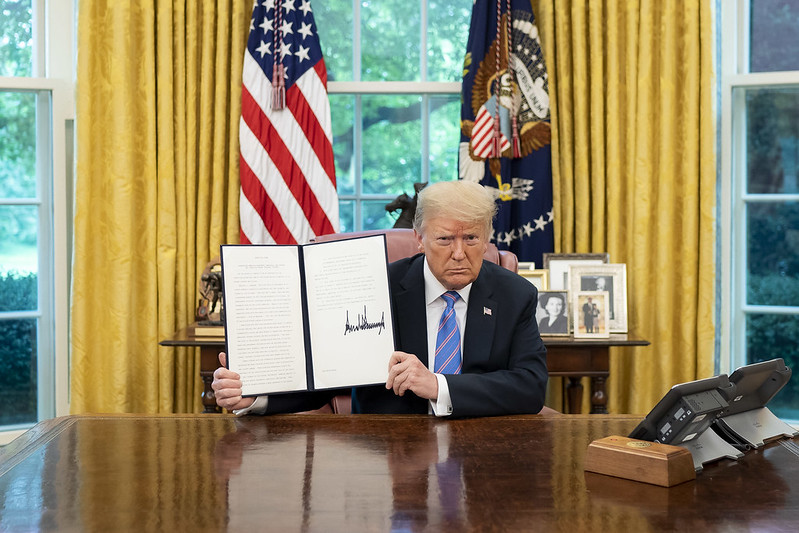On day one of his second term in office, President Donald Trump signed an executive order rescinding decades-old diversity, equity and inclusion policies, or DEI, which reinforce the 1972 Equal Employment Opportunity Act, or EEO. In line with other executive orders Trump put in place on Inauguration Day, many Americans dread what this means for their ability to attain quality employment opportunities.
The Equal Employment Opportunity Act, a landmark amendment to the Civil Rights Act of 1964, protects minority groups from discrimination in the workplace. This prohibits employers from labeling potential employees as “unqualified” based on race, gender, religion, socioeconomic status, disability, age and other attributes. Although Trump cannot revoke the law itself without the approval of Congress, several executive orders that strengthen the law were rescinded.
These measures’ adverse impact on diversity and equal opportunity within the workplace is unfathomable. A shocking transition from having protocols that protected the equal opportunity of current and future employees to virtually no protective policy at all will take place. This reality leaves many questioning whether they will have a voice, be respected and reap fair benefits for the work they produce.
For college students preparing to apply for jobs and establish themselves in the professional world, there is also cause for major concern. The job application process, which is already taxing enough, will place more strenuous demands on minority groups throughout America who continue to work through devastatingly high unemployment rates compared to their white counterparts.
Trump’s repeal of long-standing policies will have a resoundingly negative impact on the success of EEO in bringing a balance to employment rates across race and ethnicity groups.
Over the course of many years, college students around the globe work to create an academic foundation that stands out amongst their peers; an undertaking which often seems insurmountable in such a competitive job market. However, new executive demands challenge the stability of diversity and inclusion in the workplace and will make it even more difficult for minority groups.
Nevertheless, these executive measures go far beyond attaining one’s desired job title. They impact the dynamics of the workplace itself.
By revoking EEO, Trump established that employers doing business with the federal government are no longer “responsible for taking ‘affirmative action,’” within their hiring and workplace practices. This is a concerning step back from decades of civil rights progress.
As a woman aspiring to work in law, one of the most unnerving things about the impact of this order on workplace values is the likelihood that women will be taken even less seriously in comparison to their male counterparts.
Throughout U.S. history, women have regularly been dismissed in male-dominated professions, including law. While many conservative leaders believe this lack of respect should be solved with individual intervention, the work women produce in their fields is constantly undermined by the work of their male counterparts on a day-to-day basis — a norm which cannot be so easily eradicated.
As a competitive student, I am reminded of the countless times I felt I had to go out of my way to show that I was just as well-rounded and educated as my male peers. Particularly in my most passionate subjects, such as history and law, I find that I am significantly more discouraged when I don’t receive similar praise for equally thought-provoking work. While this is certainly a characteristic of my natural competitiveness, it also reveals my devotion to being successful and respected for the quality work I produce in my field — particularly in a society where the expectations of women are much higher than for men of equal job status.
Calling these concerns into mind, it becomes unsettling to imagine how these executive measures will intensify other modern-day social disparities.
The Trump administration published outrageous statements revealing the political ideology behind Trump’s executive decisions. By describing government-mandated DEI programs as “radical and wasteful,” the president said that taking extra steps to promote equal opportunity in an era where that is not naturally given is worth neither a company’s time and money nor the benefit provided to workers. This sentiment shamefully discriminates against those who have earned opportunities based on merit — a troubling sign for students looking to enter the workforce in years to come.
Not only will these presidential orders likely remain in place for another four years, but they will certainly have lasting impacts on civil rights. Trump rejects the idea that previous orders to ensure the productivity of the EEO were not discriminatory but rather promoted diversity in employment and throughout well-rounded workplaces. Our country has come a long way from denying underrepresented groups equal rights, but it’s safe to say Trump’s orders to weaken EEO is a massive step in the wrong direction.
While the president’s orders cannot drastically change the fundamental principles of EEO legislation, we can predict that American society will experience a major cultural shift toward reduced diversity in workspaces and a lack of affirmative action protecting underrepresented groups from discrimination.
Throughout all industries, college students and job applicants should keep an eye on the implementation, or lack thereof, of diversity initiatives in their desired positions.
Alanna Hagen is a first-year criminal justice and journalism combined major. She can be reached at hagen.a@northeastern.edu.















